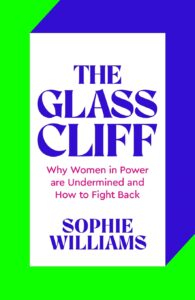 Article extracted from The Glass Cliff by Sophie Williams, Pan Macmillan, RRP $39.99
Article extracted from The Glass Cliff by Sophie Williams, Pan Macmillan, RRP $39.99
In 1968, a group of female sewing machinists from Ford’s Dagenham plant got their children ready for school, put on their shoes and jackets, and went to the factory where they worked, as usual.35 Frustrated by a pay structure that they felt blatantly favoured male workers, instead of going inside, the women – who had been on strike for three weeks at that point – boarded a coach to Whitehall with a banner reading We want sex.* This was far from the beginning of their battle for equal pay and recognition for their work. Instead, it was the end. After years of fruitless conversations, the machinists, who sewed the upholstery for the Ford cars and vans, had taken the decision to strike – a move that became a national news story, since ‘no machinists meant no seats, and no seats meant no cars’ – forcing the factory to grind to a halt, with an estimated cost to the company’s export orders of
£117 million in today’s money.
While some of their male colleagues were supportive of the strike, which also forced them to stop working, and therefore earning, during that three-week period, others were less impressed.
‘Some of the men said: “Good for you girl”, but others said: “Get back to work, you’re only doing it for pin money”,’ recalled Eileen Pullen, one of the strikers. ‘A lot of women jeered us. They didn’t go to work and their husbands were at Fords and we’d put them out of work’.
‘But our wages weren’t for pin money,’ said eighty-year-old Gwen Davis, in conversation with Pullen. ‘They were to help with the cost of living, to pay your mortgage and help pay all your bills. It wasn’t pocket money. No woman would go out to work just for pocket money, would she? Not if she’s got a family’.
Despite this, the women insist that the financial inequality wasn’t the only injustice informing their decision to strike. They also wanted to be recognized for the skills that were essential in their work. Despite their work being classed as B grade – officially unskilled work in Ford’s internal banding system – the machinists needed to pass a skills-based test in order to be hired, and so believed their work should be recognized as skilled, putting them into Ford’s C grade.
‘One of the ladies who worked with me had been a machinist for [Norman] Hartnell,’ Davis recalled. ‘She’d been a dressmaker making the Queen’s clothes. She went for a test at Ford and they turned her down.’ The bar, they pointed out, was much too high to be classed as ‘unskilled’.
By the time the eight strike leaders wrapped up discussions and headed back to the coach for the trip home, they had agreed a deal to end the strike, and the foundations had been laid for what, two years later, would become the 1970 Equal Pay Act. Yet the story still wasn’t over for the Dagenham machinists and their efforts for equality.
Although the women did return to work, it was not on the new terms that had been agreed. Prior to the strike, their pay had constituted 85 per cent of the male rate; this subsequently increased, but only to 93 per cent. Furthermore, sixteen years later, the Dagenham women were still waiting to be recognized as skilled, and so were forced to go out on strike once again.
We don’t have to look hard to see modern examples of how little has changed. At the time of writing, for instance, 40,000 female employees at the supermarket chain Asda are involved in a long-running equal-pay case against the business.** An email from the lawyer representing the workers involved, which was leaked to ITV, shows that independent experts have found that shop-floor jobs, in which women are over-represented, ‘score more highly on average on a range of [crucial] factors, such as knowledge and responsibility, than distribution jobs, [which are] held predominantly by men’. Despite this, retail workers say they are paid £1.50 to £3 less an hour than those in the more male-dominated field.
While it’s difficult to compare two different job types, each with its own distinct skills and market expectations, it does seem, much more often than not, to be the women’s skill sets that fall into the ‘less valuable’ category. Time and time again. So often, in fact, that it’s become the expectation, rather than an irregularity. As Elizabeth George, a partner at Leigh Day who has acted on workers’ rights cases remarkably similar to that at Asda, put it: ‘We think we can say, “No, the market forces argument is tainted by sex discrimination. Just because you’ve always done it, and just because everyone else does it, isn’t a material factor.”’
BUT, WHAT ABOUT . . . ?
There is sometimes a (frankly, wild) suggestion from those who want to deny the realities of Occupational Segregation that the underpayment and undervaluing of women’s work is a choice that women have made. Maybe you’ve heard people say that the gender pay gap is a myth, because men and women choose to do different jobs, and the jobs that women choose just so happen to be worse paid than those favoured by men. Silly little ladies just can’t seem to get the hang of this money-making game.
This is clearly nonsense.
Traditionally female professions, such as teaching, or nursing, are incredibly demanding, both mentally and physically, requiring an abundance of skills, education and training.
When people are planning their career paths, no one aims to train for years and then work as hard as possible for the least amount of money. But, in a society that values women’s work less, those careers that are disproportionately held by women are held in a lower regard, and so they are compensated less attractively, or fairly.
We have accepted women joining the workforce, particularly in times of great need. The war effort saw women rolling up their sleeves and joining formalized work for the first time in previously unprecedented numbers. However, the message has always been clear, and consistent:
Not too much.
Not too well paid.
Not too senior.
And certainly not as leaders.
‘We built workplaces for white men [who] had a stay-at-home partner,’ observes Reshma Saujani, a lawyer, politician and activist.* ‘Whenever you’re building anything,’ she continued, ‘you should always build for the most vulnerable [. . .] Workplaces should be built for single mom, [and] women of colour [. . .] If we’re building workplaces for [those women], they’re going to work for everybody.’ But that’s not how we’ve chosen to build the working world. At all.
Working within the constraints we have inherited – within systems that were not only not made to benefit us, but which actively rely on an assumption of our unpaid, unrecognized labour – has seen generations of women working the double shift of balancing the demands of work inside and outside the home, toiling beneath Glass Ceilings and never expecting to be able to reach the pinnacle of their own personal capabilities.41
But, in recent years, we have all witnessed a shift. Our expectations have begun to change and expand, as women have increasingly begun to demand equality, and more and more have sought to break out of traditional gendered expectations and smash through their Glass Ceilings.
* The banner, which hadn’t been properly unfurled, read in full: ‘We want sex equality’. ‘Men were leaning out of their [taxi] cabs shouting: “We’ll be back at 6!”’ recalled protester Eileen Pullen, speaking to The Guardian at the age of eighty-three, alongside her fellow strikers, forty-five years after the event.
** Although Asda denied any wrongdoing, with a spokesperson for the business saying: ‘It is not a ruling by the Employment Tribunal and is not a decision on the question of equal value. At Asda, male and female colleagues doing the same jobs in stores are paid the same and this is equally true in our distribution centres [. . .] We continue to defend these claims because retail and distribution are very different sectors, with their own distinct skill sets and rates of pay.’









Join the Discussion
Type out your comment here:
You must be logged in to post a comment.